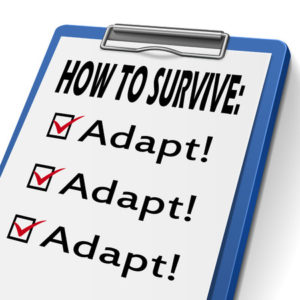Although skill, ability, and having the right opportunity seem to be stepping stones to success, the one game-changing quality that makes the biggest difference is a person’s attitude. A person’s attitude will determine their altitude in achieving success. If someone needed a tiebreaker in determining the best-qualified candidate for the position, the selection would come down to a person’s attitude. Your attitude is how you approach life.
“Life is 10 percent what you make it
and 90 percent how you take it.”
― Irving Berlin
Attitude Awareness
Attitude is one of the most important predictors of your success. Your perspective on life will determine how you cope with trials and triumphs of life. Your attitude awareness impacts your thoughts and how you feel. How you feel you translate into your actions.  If you are feeling positive and upbeat, you are more likely to greet people with a compliment or a simple, “Good Day!” instead of responding negatively, “What makes it a good day?” People are attracted to positive energy; they want to be around people who uplift them and make them feel good about themselves and the world around them.
If you are feeling positive and upbeat, you are more likely to greet people with a compliment or a simple, “Good Day!” instead of responding negatively, “What makes it a good day?” People are attracted to positive energy; they want to be around people who uplift them and make them feel good about themselves and the world around them.
When you recognize the attitude that you are portraying, you can adjust it accordingly when you notice that it’s tending to the negative. Negativity as well is positivity can permeate the environment around you. As a leader, you want to ensure that you bring forth a positive attitude so that the people who follow you do so in turn. This impacts the people that you serve not only each other but who you’re ultimately there for.
Attitude Determines Your Resiliency
Your attitude is a foundation to your success. Although we would love for life to stay at the all-time high, we know that everyone in life faces challenges. It is how we move through that challenge that makes the difference. Attitude is a choice. Sometimes you may forget that you have a choice as to what attitude you wish to have. When you realize that you have a choice, you can then get on the right track. You become more resilient when you choose a positive outlook because you will be open to possibility and opportunity. If you choose to have a negative outlook on life you will be inclined to focus on problems, not solutions. Seeing the possibilities encourages creativity and innovation and allows you to move through challenges more quickly.
Attitude Conquers Fear
 Developing a positive attitude means that you are developing an attitude that is stronger in faith than the fear. When people make decisions or take actions based on fear, they often make the wrong choices and do not get the results or outcomes that they hoped for. When you are able to maintain a positive attitude, you are not driven solely on the emotion you are able to look at facts, and you’re able to think clearly about what direction you want to take. Your attitude will determine how persistent you will be in the face of obstacles and you will be able to trust yourself and your ability to move through them. You have faced obstacles before. Think about the patterns and your approach to how you face those obstacles in the past. They will help you determine some of the actions that you need to do moving forward when making decisions or taking the next steps. Be open to new information that will support you in reaching the outcomes you want to achieve. Let your faith in yourself and your people be stronger than the fear of uncertainty or failure.
Developing a positive attitude means that you are developing an attitude that is stronger in faith than the fear. When people make decisions or take actions based on fear, they often make the wrong choices and do not get the results or outcomes that they hoped for. When you are able to maintain a positive attitude, you are not driven solely on the emotion you are able to look at facts, and you’re able to think clearly about what direction you want to take. Your attitude will determine how persistent you will be in the face of obstacles and you will be able to trust yourself and your ability to move through them. You have faced obstacles before. Think about the patterns and your approach to how you face those obstacles in the past. They will help you determine some of the actions that you need to do moving forward when making decisions or taking the next steps. Be open to new information that will support you in reaching the outcomes you want to achieve. Let your faith in yourself and your people be stronger than the fear of uncertainty or failure.
“We cannot change our past… we cannot change the fact that people will act in a certain way. We cannot change the inevitable. The only thing we can do is play on the one string we have, and that is our attitude. I am convinced that life is 10% what happens to me and 90% of how I react to it. And so it is with you… we are in charge of our Attitudes.”
― Charles R. Swindoll
The attitude that you choose to have can take you on the ascent of new heights or can pull the rug from under you and descend you to the beginning. Your attitude is a choice. A choice to rise above any challenges you face and to persevere knowing that you will achieve what you go after.
DEBRA KASOWSKI, BScN CEC is an award-winning best-selling author, transformational speaker, blogger, and Certified Executive Coach. She has a heart of a teacher and is certified in Appreciative Inquiry and Emotional Intelligence. Debra is the host of The Millionaire Woman Show podcast focusing on helping people live rich from the inside out through leadership, business, and human potential. Her writing has been published in a variety of print and online magazines. Debra Kasowski International helps executives, entrepreneurs, and organizations boost their productivity, performance, and profits. It all starts with people and passion. Sign up the Success Secrets Newsletter and get your free mp3 download today! www.debrakasowski.com

 The one constant in everyone’s life is change. We are all faced with changes and challenges on a day-to-day basis. One of the greatest challenges that leaders within organizations face is being able to keep up with their workloads while putting out fires that seem to arise. They are taken away from some of their critical work to focus intently on performance issues. Managing people and working with people can sometimes be draining especially when you’re faced with resistance and lack of awareness. Sometimes it feels like no matter how much effort you put into something that you are unable to achieve what you hope to. At times this can be disheartening for a leader to lead because they may lose sight of their focus and the meaning of the work that they were driven to do. Don’t give in and don’t give up! Adapt!
The one constant in everyone’s life is change. We are all faced with changes and challenges on a day-to-day basis. One of the greatest challenges that leaders within organizations face is being able to keep up with their workloads while putting out fires that seem to arise. They are taken away from some of their critical work to focus intently on performance issues. Managing people and working with people can sometimes be draining especially when you’re faced with resistance and lack of awareness. Sometimes it feels like no matter how much effort you put into something that you are unable to achieve what you hope to. At times this can be disheartening for a leader to lead because they may lose sight of their focus and the meaning of the work that they were driven to do. Don’t give in and don’t give up! Adapt! Leaders know that it’s important to build and nurture a network of relationships before you need them. When you are in crisis or faced with the challenge, you need to have that support immediately and if you don’t have it is more challenging to get through the tough times. When you build relationships, people are quick to reciprocate and support each other lessening the challenges.
Leaders know that it’s important to build and nurture a network of relationships before you need them. When you are in crisis or faced with the challenge, you need to have that support immediately and if you don’t have it is more challenging to get through the tough times. When you build relationships, people are quick to reciprocate and support each other lessening the challenges.



